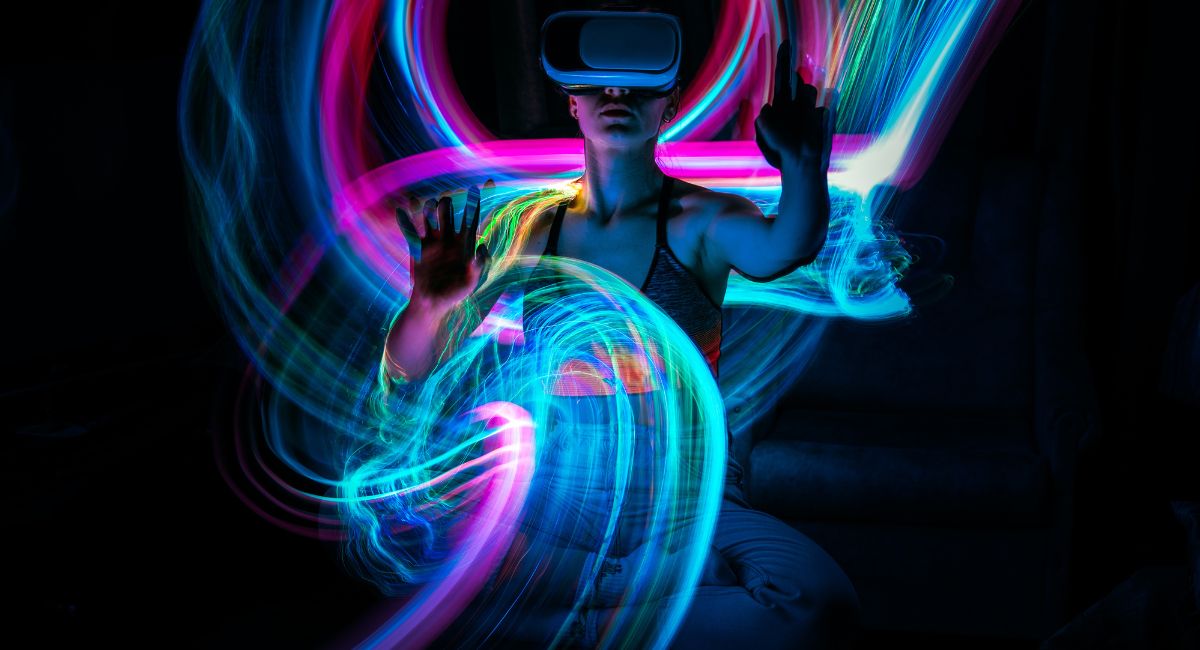Top 10 Trends in Metaverse Gaming In 2023 Started By Pro Gamers
Metaverse gaming refers to the convergence of virtual reality (VR), augmented reality (AR), and blockchain technology to create immersive and interactive gaming experiences within a shared virtual universe. It is an extension of the concept of the metaverse, which is a virtual space where users can interact with a computer-generated environment and other users in real-time.
In metaverse gaming, players can enter a digital universe that transcends traditional gaming boundaries. They can explore vast virtual worlds, interact with other players, and engage in various gaming activities, such as quests, battles, trading, and socializing. Metaverse gaming aims to provide a highly immersive and persistent gaming experience that blurs the lines between the virtual and physical worlds.
Blockchain technology plays a crucial role in metaverse gaming by enabling secure ownership, transfer, and trading of in-game assets. Through the use of non-fungible tokens (NFTs), players can have true ownership of digital items, such as weapons, armor, virtual real estate, or unique characters. NFTs are stored on a blockchain, ensuring their scarcity, authenticity, and provable ownership.
Metaverse gaming also incorporates elements of virtual reality and augmented reality, allowing players to interact with the virtual world using immersive VR headsets or overlay digital elements onto the real world through AR-enabled devices. This integration enhances the sense of presence and realism, making the gaming experience more immersive and engaging.
Additionally, metaverse gaming fosters social interaction and collaboration among players. It provides a platform for players to connect, communicate, and form communities within the virtual universe. Players can participate in cooperative missions, multiplayer battles, or even engage in virtual economies and trade with other players.
The concept of metaverse gaming has gained significant attention and is seen as a potential future of gaming. It represents a shift from traditional, isolated gaming experiences to interconnected and persistent virtual worlds. The metaverse gaming ecosystem is continuously evolving, with advancements in technology, virtual economies, and social interactions, creating a new frontier for gamers to explore and engage with digital universes in innovative and immersive ways.
Also, read – The Metaverse In Gaming: A Match Made In Digital Heaven
Top 10 Metaverse gaming trends
1. Increased adoption of VR and AR. Virtual reality (VR) and augmented reality (AR) are two of the key technologies that will power the metaverse. In 2023, we can expect to see more and more gamers adopt VR and AR headsets, as the technology becomes more affordable and accessible. This will open up new possibilities for gaming, as players will be able to experience games in a more immersive and realistic way.
2. Rise of social gaming. Social gaming is another trend that is expected to grow in popularity in the metaverse. In a social game, players can interact with each other in real time, creating a more immersive and engaging experience. This trend is already being seen in games like Fortnite and Roblox, which have millions of active players worldwide.
3. Growth of NFTs and blockchain gaming. Non-fungible tokens (NFTs) and blockchain gaming are two other technologies that are expected to play a major role in the metaverse. NFTs can be used to represent in-game items, such as weapons, armor, and land. This will allow players to own their in-game assets and trade them with other players. Blockchain gaming will also allow for more secure and transparent transactions.
4. Collaboration between big tech companies. Big tech companies, such as Meta (formerly Facebook), Microsoft, and Google, are all investing heavily in the metaverse. This collaboration is expected to accelerate the development of the metaverse and make it more accessible to a wider audience.
5. Development of new game genres. The metaverse will open up new possibilities for game developers, as they will be able to create games that are not possible in the real world. This could lead to the development of new game genres, such as social VR games, NFT-based games, and blockchain games.
6. Increased investment in metaverse startups. The growing interest in the metaverse has led to an increase in investment in metaverse startups. This investment is expected to fuel the development of new metaverse products and services.
7. Mass adoption of the metaverse. While the metaverse is still in its early stages, it is expected to reach mass adoption in the coming years. This will be driven by the increasing popularity of VR and AR, the growth of social gaming, and the collaboration between big tech companies.
8. Impact on the global economy. The metaverse is expected to have a major impact on the global economy. It could create new jobs, generate new revenue streams, and disrupt existing industries.
9. Challenges and risks. While the metaverse has the potential to revolutionize the way we live and work, it also faces a number of challenges and risks. These include security concerns, privacy issues, and the potential for addiction.
10. The future of the metaverse. The metaverse is still in its early stages, but it has the potential to change the world. It is a vast and ever-evolving landscape, and it will be exciting to see how it develops in the years to come.
The metaverse is a rapidly growing trend that is poised to revolutionize the gaming industry. The trends listed above are just a few of the ways that the metaverse is expected to impact gaming in the years to come.
Risks involved in Metaverse gaming
While metaverse gaming offers exciting possibilities, there are also several risks associated with this emerging form of gaming. Here are some potential risks of metaverse gaming:
- Security and Privacy Risks: Metaverse gaming involves the collection and storage of personal data, including user profiles, in-game activities, and financial transactions. There is a risk of data breaches, hacking, or unauthorized access to sensitive information, leading to identity theft or fraud.
- Virtual Asset Theft and Scams: The use of blockchain technology and non-fungible tokens (NFTs) in metaverse gaming introduces the risk of virtual asset theft. Hackers may target players’ digital wallets or exploit vulnerabilities in the blockchain infrastructure, resulting in the loss of valuable in-game assets. Moreover, scams and fraudulent schemes can emerge, deceiving players into purchasing counterfeit or non-existent virtual items.
- Addiction and Excessive Spending: Metaverse gaming can be highly immersive and addictive, leading to excessive gaming and neglect of real-life responsibilities. Some players may develop compulsive behaviors and spend significant amounts of time and money on virtual assets, leading to financial strain and negative impacts on mental and physical well-being.
- Inadequate Regulation: The regulatory landscape surrounding metaverse gaming is still evolving. There may be uncertainties and gaps in regulations, leading to issues related to consumer protection, taxation, copyright infringement, and fraudulent activities. Lack of oversight and clear guidelines can pose risks to players and the overall integrity of metaverse gaming platforms.
- Social and Emotional Risks: The social nature of metaverse gaming can expose players to toxic behavior, cyberbullying, harassment, or inappropriate content. Moreover, the blurring of boundaries between virtual and real-life interactions can lead to challenges in distinguishing between online and offline identities, potentially impacting mental health and social well-being.
- Technical Challenges and Infrastructure Limitations: Metaverse gaming requires robust technical infrastructure to support large-scale virtual worlds and ensure smooth gameplay experiences. Network issues, server downtimes, latency, and scalability challenges can disrupt gameplay and lead to frustration among players.
- Lack of Interoperability and Fragmentation: The metaverse gaming landscape may become fragmented, with multiple platforms and virtual worlds that are not compatible or interconnected. This can limit the ability of players to transfer assets or engage in cross-platform interactions, resulting in a fragmented user experience and reduced value of virtual assets.
- Legal and Intellectual Property Concerns: Metaverse gaming involves the creation and exchange of user-generated content within virtual worlds. There may be challenges related to copyright infringement, intellectual property rights, and ownership disputes, especially when players create and share content based on existing real-world brands or copyrighted material.
- Health and Safety Risks: The immersive nature of metaverse gaming, particularly in virtual reality (VR), can lead to physical discomfort, motion sickness, and even injuries if players are not mindful of their surroundings. Players may also be exposed to excessive screen time, sedentary behavior, and potential health risks associated with prolonged gaming sessions.
- Economic Instability and Virtual Economy Risks: Metaverse gaming often involves virtual economies where players trade and transact using in-game currencies or assets. Economic instability, market manipulation, hyperinflation, or economic crashes within these virtual economies can impact player experiences, disrupt in-game commerce, and undermine the value of virtual assets.
It’s important for players and stakeholders in metaverse gaming to be aware of these risks and take necessary precautions to mitigate them. This includes practicing good cybersecurity hygiene, setting boundaries for gameplay, being mindful of spending habits, fostering a healthy gaming environment, and advocating for responsible regulation and oversight in the metaverse gaming industry.
Amelie Wu, CMO & Co-Founder of @Metaoasis_, Talks Web3 Gaming in @nftstudio24 Interview ! In this talk, she shares her expertise on gaming and the metaverse. Discover the endless possibilities of blockchain gaming. Don’t miss this exclusive conversation from @teamz_inc ! pic.twitter.com/XxHcRTgggI
— NftStudio24.eth (@nftstudio24) May 26, 2023
Future of Metaverse Gaming
The future of metaverse gaming holds tremendous potential as technology continues to advance and the gaming landscape evolves. Here are some key aspects that define the future of metaverse gaming:
- Enhanced Immersion: Advancements in virtual reality (VR), augmented reality (AR), and haptic technologies will greatly enhance the immersion factor in metaverse gaming. Players can expect more realistic graphics, improved sensory feedback, and a greater sense of presence within the virtual worlds.
- Seamless Interoperability: The future of metaverse gaming will involve increased interoperability between different platforms and virtual worlds. Players will have the ability to seamlessly transfer their characters, assets, and progress across multiple metaverse environments, fostering a more connected and unified gaming experience.
- Player-Driven Economies: Metaverse gaming will continue to empower players with greater control over virtual economies. Blockchain technology and non-fungible tokens (NFTs) will enable players to truly own and trade their in-game assets, creating vibrant player-driven economies with real-world value.
- Social Interaction and Collaboration: Metaverse gaming will evolve to offer more sophisticated social features, allowing players to interact and collaborate in meaningful ways. Players will be able to form communities, join forces in quests, engage in player-created content, and participate in shared virtual experiences.
- Cross-Platform and Cross-Reality Experiences: The future of metaverse gaming will break down barriers between different platforms and realities. Players will be able to seamlessly transition between VR, AR, mobile devices, and traditional gaming platforms, enjoying a consistent experience across various devices.
- Persistent and Evolving Worlds: Metaverse gaming will feature persistent and evolving virtual worlds that continuously change and adapt based on player actions and community-driven content. Events, updates, and expansions will keep the metaverse dynamic, providing a constant stream of new experiences and challenges.
- Integration of AI and Machine Learning: Artificial intelligence (AI) and machine learning will play a significant role in metaverse gaming. AI-powered NPCs (non-player characters) will provide more realistic and dynamic interactions, adapt to player behavior, and create more engaging and immersive gameplay experiences.
- Virtual Reality Sports and Esports: Metaverse gaming will extend beyond traditional gaming experiences to encompass virtual reality sports and esports. Virtual competitions and tournaments in various sports and gaming genres will attract a global audience, blurring the line between physical and virtual sports events.
- Education and Training Applications: Metaverse gaming will find applications beyond entertainment, including education and training. Virtual classrooms, simulations, and training environments will provide immersive and interactive learning experiences, enabling individuals to acquire new skills and knowledge in engaging ways.
- Integration with Real-World Applications: Metaverse gaming will increasingly integrate with real-world applications and industries. Virtual marketplaces, virtual real estate, virtual fashion, and virtual events will become more prevalent, allowing players to engage in virtual experiences that mirror and intersect with their real-world interests.
It’s important to note that the future of metaverse gaming will depend on advancements in technology, widespread adoption, regulatory frameworks, and the creativity of developers and players. As these factors converge, the metaverse gaming experience will become increasingly sophisticated, immersive, and intertwined with various aspects of our lives.
Stay informed with daily updates from Blockchain Magazine on Google News. Click here to follow us and mark as favorite: [Blockchain Magazine on Google News].
Get Blockchain Insights In Inbox
Stay ahead of the curve with expert analysis and market updates.
latest from tech
Disclaimer: Any post shared by a third-party agency are sponsored and Blockchain Magazine has no views on any such posts. The views and opinions expressed in this post are those of the clients and do not necessarily reflect the official policy or position of Blockchain Magazine. The information provided in this post is for informational purposes only and should not be considered as financial, investment, or professional advice. Blockchain Magazine does not endorse or promote any specific products, services, or companies mentioned in this posts. Readers are encouraged to conduct their own research and consult with a qualified professional before making any financial decisions.

 Bitcoin
Bitcoin  Ethereum
Ethereum  Tether
Tether  XRP
XRP  Solana
Solana  Dogecoin
Dogecoin  USDC
USDC  Lido Staked Ether
Lido Staked Ether  Cardano
Cardano  TRON
TRON  Avalanche
Avalanche  Chainlink
Chainlink  Toncoin
Toncoin  Wrapped stETH
Wrapped stETH  Wrapped Bitcoin
Wrapped Bitcoin  Shiba Inu
Shiba Inu  Sui
Sui  Stellar
Stellar  Polkadot
Polkadot  Hedera
Hedera  Hyperliquid
Hyperliquid  WETH
WETH  Bitcoin Cash
Bitcoin Cash  LEO Token
LEO Token  Uniswap
Uniswap  Litecoin
Litecoin  Pepe
Pepe  Wrapped eETH
Wrapped eETH  NEAR Protocol
NEAR Protocol  Ethena USDe
Ethena USDe  USDS
USDS  Aptos
Aptos  Aave
Aave  Internet Computer
Internet Computer  Cronos
Cronos  POL (ex-MATIC)
POL (ex-MATIC)  Mantle
Mantle  Ethereum Classic
Ethereum Classic  Render
Render  WhiteBIT Coin
WhiteBIT Coin  MANTRA
MANTRA  Monero
Monero  Dai
Dai  Bittensor
Bittensor  Artificial Superintelligence Alliance
Artificial Superintelligence Alliance  Arbitrum
Arbitrum  Ethena
Ethena 



